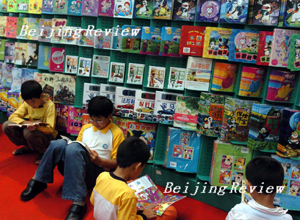|

Among the 224 titles that have been read by first grade students in Nanning's No. 2 High School, novels about knights by the famous writers Jin Yong and Gu Long took the lead, accounting for 25 percent of the total. Computer magazines and novels like The Lord of the Rings and the Harry Potter series accounted for 10 percent; other foreign literature made up 7 percent, and Chinese classical literature only occupied 2 percent.
Choosing appropriate non-classroom reading for students has received special attention from experts, scholars and society for a long time. Peng Junjiao, a Chinese teacher in Nanning's No. 2 High School, said that while high school students read a wide range of books, they have not developed a strong reading habit. Some just read for novelty and some abandon themselves to comics.
As a Chinese teacher, Peng holds that a wide range of reading helps students to accumulate knowledge and build reading comprehension. She does not encourage students to read reference books, however, especially composition collections, saying these formulate students' thinking and discourage their creativity. Reading classical literature, on the other hand, helps to nurture their morality, she added.
Lack of good material
Though various children's books can be obtained in China's bookstores, comic books and cartoons from Japan and the West account for a large proportion of the available reading material. Given that Chinese classical works like A Journey to West and A Dream of Red Mansions have been made into cartoons, they are losing competitive strength to their foreign counterparts.
"I've been reading those classical Chinese stories since I was very young and now I'm not interested in them any more," said Sun Mingming, a sixth grade primary school student in Beijing.
Most of the books she and her fellow classmates read are Japanese cartoons, aside from a few tales written by Chinese fairy writer Zheng Yuanjie. Aside from these, they did not see any other books that would hold their interest, Sun added.
An employee at Xinhua Bookstore, the country's largest book chain, commented that young children like comics and cartoons, which is a gap at home that needs to be filled. For older children, who like children's literature, there are few original works.
Some educators maintain that China's children's books lack compelling plots and easily understandable language, which is primarily responsible for their unpopularity. However, with the prevalence of television and the Internet, children's interests differ from the past. When they want to read, they prefer books that are fun and entertaining.
Deng Lidong, Deputy Director of the Education Science Institute in Nanning, spoke of the negative impact of the lack of proper reading material for children. On the one hand, there's an insufficiency of appropriate reading material for children; on the other hand, "improper" books such as sentimental novels and illegal publications are gradually catching their eyes. They are too young to tell what's good and what's bad, he said, which could lead to unfavorable influences on their lives.
Costly books
Another issue experts cite for children's lack of interest in reading is the high cost of books. Guo Hong, who was picking up books for her 10-year-old son in Beijing's Xidan Bookstore, gave up on a set of 100,000 Whys after she discovered it would cost hundreds of yuan or dozens of dollars. "I just don't understand why children's books are so expensive," Guo said. Pointing to some books nearby, she said, "Even the cheapest will cost you 20 yuan ($2.5) or 30 yuan ($3.7), let alone those deluxe editions."
Expensive books leave many no choice but to read them in the bookstore for free.
"I have to admit that I can't afford these books," said a boy squatting in a corner of the store, with a book open in his hands.
"I come here to read free books every weekend."
He said there were too few books in his school library, but the store is like a "sea" of books and he can read whatever he wants. "Many want to buy but the high prices scares them away."
Children's books also are considered to be poorly made. "Today's children's books look splendid outside, but are so roughly manufactured inside," Meng Hongxia from Xinjiang complained as she was buying books for her 3-year-old son.
Meng was referring to Grimm's Fairy Tales, a book published by a Shanghai-based publishing group. Instead of the full Grimm's Fairy Tales collection, the 40- or 50-page book has only five stories inside, with every page containing several lines of Chinese characters annotated with pinyin and the rest of the page full of colored cartoon drawings.
Rich content, many parents believe, is more important than diverse colors and drawings. Though they are investing more in the education of their children with the improvement in incomes, they won't buy books that fail to meet their standards. | 